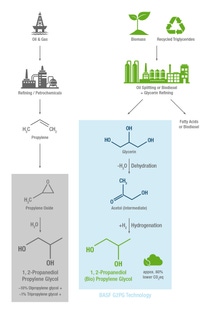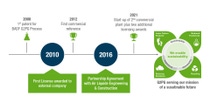Licensing
Our Glycerin to Propylene Glycol (G2PG) Process Technology
G2PG Process - Green chemistry route to propylene glycol
In the G2PG process, refined glycerin is hydrogenated at very high conversion and selectivity in liquid phase with a proprietary BASF copper catalyst. The conversion to Propylene Glycol takes place in two serial fixed bed reactors and at temperatures between 175° to 195° Celsius and at a pressure of 75 or 200 bar.
The crude product is then further purified downstream in a two-column distillation to produce propylene glycol with a technical grade of more than 99.5% purity. It is possible to produce pharma grade Propylene Glycol depending on feedstock quality.

G2PG – a young but already experienced technology
The G2PG technology to produce Bio-Propylene Glycol has been commercially proven and successfully operating since 2012. BASF teamed-up with Air Liquide Engineering & Construction to license the G2PG technology, with more than four process design packages executed until today. Partnering enables us to achieve a fast and reliable execution of future projects.

